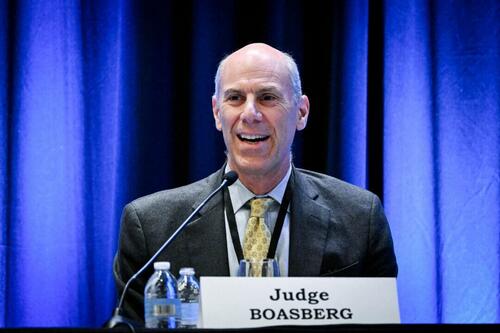Authored by Sam Dorman via The Epoch Times (emphasis ours),
U.S. District Judge James Boasberg seemed inclined during a hearing on April 3 to find there was probable cause that President Donald Trump’s administration was in contempt of court by disobeying his order prohibiting deportations of suspected Venezuelan gang members under the Alien Enemies Act.

The Trump administration has said it didn’t violate two of Boasberg’s orders, which prohibited illegal immigrants from being deported under that particular law but allowed deportations under other authorities.
During the April 3 hearing, Boasberg seemed incredulous while asking Department of Justice (DOJ) Attorney Drew Ensign about his knowledge of deportations of suspected and confirmed foreign gang members on March 15. He also told Ensign it seemed likely that the administration didn’t follow his directions and acted in “bad faith.”
Toward the end of their exchange, Boasberg said he thought he could make a finding of probable cause and could do so without related information that the administration said was protected by a legal doctrine known as the state secrets privilege. Both Ensign and American Civil Liberties Union attorney Lee Gelernt, who represented the Venezuelan plaintiffs suing Trump, fielded questions from Boasberg about the best way to proceed if he did find probable cause.
A ruling is not expected until next week when the court will hear arguments over whether Boasberg should issue a firmer block—known as a preliminary injunction—on the administration’s activities. It’s unclear how Boasberg will proceed with potential contempt. He asked about the possibility of the administration submitting declarations or the court having a hearing on the issue.
The hearing was the latest in a series of tense confrontations between the Trump administration and a federal judge overseeing multiple cases against the government. Trump is currently seeking the Supreme Court’s intervention to halt Boasberg’s orders after the U.S. Court of Appeals for the D.C. Circuit rejected a similar request before three other judges.
The case—J.G.G., et al. v. Trump, et al.—has raised questions about where executive authority ends and judicial authority begins. Trump has called for Boasberg’s impeachment while the administration has more generally told appeals courts that the judge encroached on the president’s powers.
In a March 19 filing, the administration told Boasberg that “what began as a dispute between litigants over the President’s authority to protect the national security and manage the foreign relations of the United States pursuant to both a longstanding Congressional authorization and the President’s core constitutional authorities has devolved into a picayune dispute over the micromanagement of immaterial fact-finding.”
In a subsequent March hearing, Boasberg said from the bench that the language he saw in the case was “disrespectful” and “intemperate.” At one point, he advised Ensign to ensure that his team at the DOJ retained a lesson he taught his clerks about their reputation and credibility being the most valuable treasure they possess.
On March 15, the Trump administration deported more than 250 Venezuelan nationals accused of being members of either the Tren de Aragua gang or the MS-13 gang, both U.S.-designated terrorist organizations. That same day, Boasberg ordered that the flights cease after several anonymous Venezuelans filed an emergency bid to block their deportations. Officials have said the flights already took off when the judge issued his written order.
In a March 27 TruthSocial post, Trump cast doubt on the likelihood of Boasberg being randomly assigned to a fourth case against him. That was the same day that Boasberg, in another case, ordered government officials to preserve messages transmitted via the Signal app after a watchdog group sued Defense Secretary Pete Hegseth and other top officials in the administration.
During the April 3 hearing, Boasberg seemed to indirectly respond to suspicions that he wasn’t randomly assigned to the deportation case. At one point, he said he was alerted around 7 a.m. ET on March 15 and suggested that because he was available to review the plaintiffs’ pseudonymous filing, they were able to get relief. The case was assigned to him after he was initially alerted, Boasberg said.
Jacob Burg contributed to this report.
Loading...